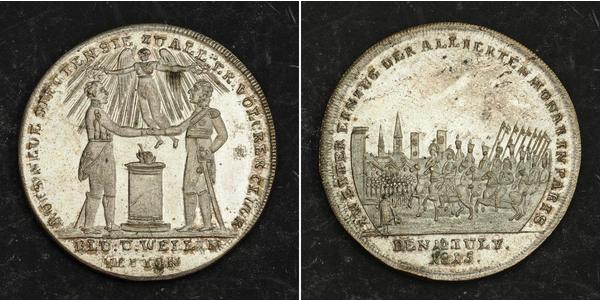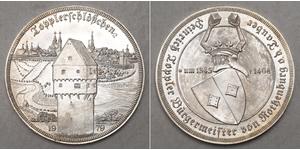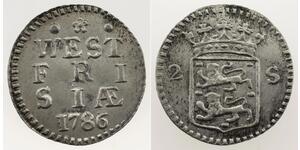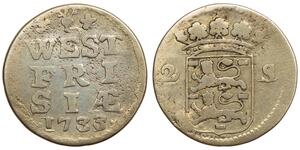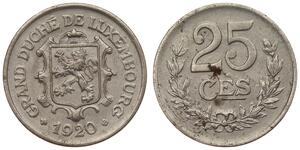(Vendida por $32.0)
1815, Prussia/Great Britain. Brass "Battle of Warterloo/Entering of Paris" Medal.
Mint Place: Nurnberg Reference: Bramsen 1676, Julius 3407, Eimver, Wellington 79. Condition: Most of silver plating remained, otherwise a nice XF-AU! Denomination: Jetton (privately struck medal) - General Blucher and the Duke of Wellington / Entering of the British and Prussian forces in Paris Material: Brass (silver plated) Weight: 15.03gm Diameter: 33mm
Obverse: Winged Victory flying above burning altar and wreathing the Victorious Prussian and British commanders (General Blücher and the Duke of Wellington). Legend: AUFS NEUE SIEGTEN SIE ZU ALLER VÖLKERGLÜCK ("They won again for the sake of the happyness of all people.") Exergue: BLU : U. WELLING ("Blucher & Wellington") / IETTON ("jeton" - meaning, that this is not an official medal and not a coin) Reverse: The Prussian and British cavalry entering the City of Paris. Legend: ZWEITER EINZUG DER ALLIERTEN MONAR. IN PARIS ("The 2nd entering of the allied monerchies in Paris.") Exerge: DEN 10 . JULY. 1815. ("10th of July, 1815")
The Battle of Waterloo was fought on Sunday, 18 June 1815, near Waterloo in present-day Belgium, then part of the United Kingdom of the Netherlands. A French army under the command of Napoleon Bonapartewas defeated by two of the armies of the Seventh Coalition: a British-led Allied army under the command of the Duke of Wellington, and a Prussian army under the command of Gebhard Leberecht von Blücher, Prince of Wahlstatt. The battle marked the end of the Napoleonic Wars.
Upon Napoleon's return to power in March 1815, many states that had opposed him formed the Seventh Coalition, and began to mobilize armies. Wellington and Blücher's armies were cantoned close to the north-eastern border of France. Napoleon chose to attack them separately in the hope of destroying them before they could join in a co-ordinated invasion of France with other members of the coalition. On 16 June Napoleon successfully attacked the bulk of the Prussian army at the Battle of Ligny with his main force, while at the same time a portion of the French army attacked an Allied army at the Battle of Quatre Bras. Despite holding his ground at Quatre Bras, the defeat of the Prussians forced Wellington to withdraw north to Waterloo on the 17th. Napoleon sent a third of his forces to pursue the Prussians, who had withdrawn parallel to Wellington in good order. This resulted in the separate and simultaneous Battle of Wavre with the Prussian rear-guard.
Upon learning that the Prussian army was able to support him, Wellington decided to offer battle on the Mont-Saint-Jean escarpment, across the Brussels road. Here he withstood repeated attacks by the French throughout the afternoon of the 18th, aided by the progressively arriving Prussians. In the evening Napoleon committed his last reserves, the French Imperial Guard, to a desperate final attack, which was narrowly beaten back. With the Prussians breaking through on the French right flank, Wellington's Anglo-allied army counter-attacked in the centre, and the French army was routed.
Waterloo was the decisive engagement of the Waterloo Campaign and Napoleon's last. According to Wellington, the battle was "the nearest-run thing you ever saw in your life". Napoleon abdicated four days later, and on 7 July coalition forces entered Paris. The defeat at Waterloo ended Napoleon's rule as Emperor of the French, and marked the end of his Hundred Days return from exile. This ended the First French Empire, and set a chronological milestone between serial European wars and decades of relative peace.
The battlefield is located in the municipalities of Braine-l'Alleud and Lasne, about 15 kilometres (9.3 mi) south of Brussels, and about 2 kilometres (1.2 mi) from the town of Waterloo. The site of the battlefield today is dominated by a large monument, the Lion's Mound. As this mound was constructed from earth taken from the battlefield itself, the contemporary topography of the battlefield near the mound has not been preserved.
Gebhard Leberecht von Blücher, Fürst von Wahlstatt (German pronunciation: [ˈɡɛphaɐ̯t ˈleːbəʁɛçt fɔn ˈblʏçɐ]; 16 December 1742 – 12 September 1819), Graf (count), later elevated to Fürst (prince) von Wahlstatt, was a Prussian Generalfeldmarschall (field marshal). He earned his greatest recognition after leading his army against Napoleon I at the Battle of the Nations at Leipzig in 1813 and the Battle of Waterloo in 1815.
Blücher was born in Rostock, the son of a retired army captain. His military career began in 1758 as a hussar in the Swedish Army. He was captured by Prussians in 1760 during the Pomeranian Campaign and thereafter joined the Prussian Army, serving as a hussar officer for Prussia during the remainder of the Seven Years' War. In 1773, Blücher was forced to resign by Frederick the Great for insubordination. He worked as a farmer until the death of Frederick in 1786, when Blücher was reinstated and promoted to colonel. For his success in the French Revolutionary Wars, Blücher became a major general in 1794.
He became a lieutenant general in 1801 and commanded the cavalry corps during the Napoleonic Wars in 1806. Due to being outnumbered and lack of provisions and ammunition, he was forced to surrender at the Battle of Lübeck. War broke out between Prussia and France again in 1813 and Blücher returned to active service at the age of 71. He was appointed full general over the Prussian field forces and clashed with Napoleon at the Battles of Lützen and Bautzen. Later he won a critical victory over the French at the Battle of Katzbach. Blücher commanded the Prussian Army of Silesia at the Battle of the Nations where Napoleon was decisively defeated. For his role, Blücher was made a field marshal and received his title of Prince of Wahlstatt.
After Napoleon's return in 1815, Blücher took command of the Prussian Army of the Lower Rhine and coordinated his force with that of the British and Allied forces under the Duke of Wellington. At the Battle of Ligny, his horse was shot from underneath him and he was severely injured, and the Prussians sustained a serious defeat and retreated. After recovering, Blücher resumed command and joined Wellington at the Battle of Waterloo, with the intervention of Blücher's army playing a decisive role in the final Allied victory.
Blücher was made an honorary citizen of Berlin, Hamburg and Rostock. Known for his fiery personality, he was nicknamed Marschall Vorwärts ("Marshal Forward") by his soldiers because of his aggressive approach in warfare. Along with Paul von Hindenburg, he was the highest-decorated Prussian-German soldier in history: Blücher and Hindenburg are the only German military officers to have been awarded the Star of the Grand Cross of the Iron Cross.

1 Scudo Estados Pontificios (752-1870) Plata
grupo tiene 4 monedas / 3 precios
Add coin to this group
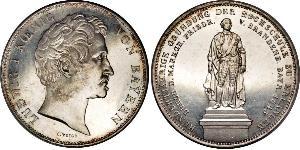
2 Thaler Reino de Baviera (1806 - 1918) ...
grupo tiene 22 monedas / 22 precios
Add coin to this group

1/2 Dólar Estados Unidos de América (177 ...
grupo tiene 8 monedas / 7 precios
Add coin to this group

6 Zloty / 1 Thaler Polonia / República d ...
grupo tiene 35 monedas / 34 precios
Add coin to this group

1 Thaler Obispado Principesco de Bamberg ...
grupo tiene 5 monedas / 4 precios
Add coin to this group
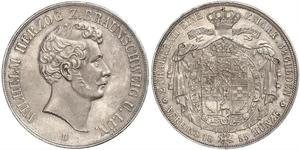
2 Thaler Ducado de Brunswick (1815 - 191 ...
grupo tiene 18 monedas / 18 precios
Add coin to this group

2 Thaler / 3.5 Gulden Reino de Baviera ( ...
grupo tiene 35 monedas / 33 precios
Add coin to this group
2 Stuiver Países Bajos Plata
grupo tiene 33 monedas / 33 precios
⇑
Una de ellas es

